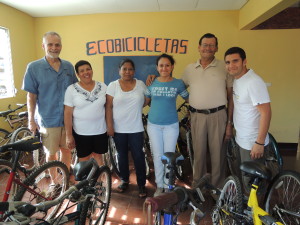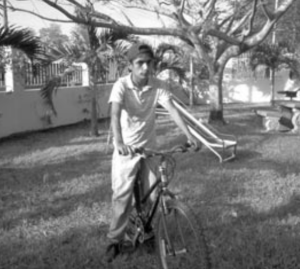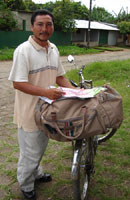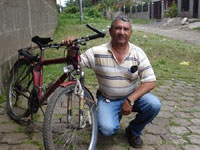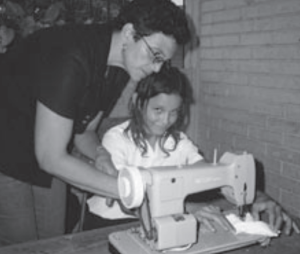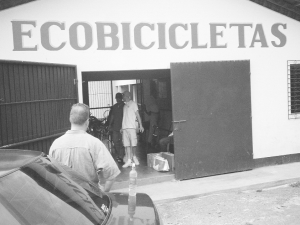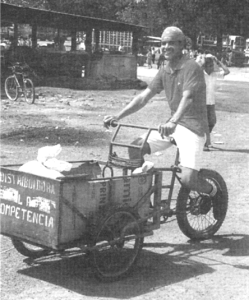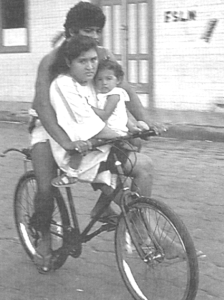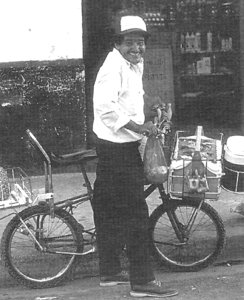Spring 2009 InGear
Over the years, word got around that, in addition to bicycles, we were recycling used sewing machines. This practice started somewhat by accident, and gradually became a regular part of our work. Initially, “Treadles for Progress” simply meant sending along several refurbished sewing machines with our bike shipments. Since sewing machines are encased and fit neatly in the remaining space in our shipping containers, essentially, they were stowaways with the bike shipments.
But requests from our overseas partners for sewing machines separate from bikes increased. Unfortunately, we couldn’t afford to do that. But we didn’t exactly give up on the idea either.
Shipping bikes is easier, and less costly per unit, than shipping sewing machines. First of all, bikes are light, sewing machines are heavy. Second, shipping containers come in two sizes, 20-foot and 40-foot. Forty-foot containers are the most cost effective for us, and we collect enough bikes to regularly fill them. Used sewing machines, on the other hand, are much less available than used bikes, so we can’t easily fill containers with them. In order for us to get sewing machines overseas, separate from bikes, air freight, which is very expensive, is our only option. This is why we usually send only six or seven machines at a time.
Last year we developed a partnership in Kyrgyzstan. Our partner there, a community organization, wanted sewing machines they would own and on which they could train locals who wanted to become tailors. By selling the products they made, they could help offset the shipping costs. This, along with a grant from the International Monetary Fund, enabled us to air freight 25 sewing machines to Kyrgyzstan.
The success of this program gave us the impetus to start other sewingmachine-only programs in a similar manner. We now have two more, one in Nicaragua, the other in Uganda.
In order to promote our sewing machine program more, we’ve invited several women’s groups in our region to collect sewing machines. Along with this, Vorhees High School in Vorhees, New Jersey, is enlisting their home economics club to do the same.
Uganda Sewing Machine Program
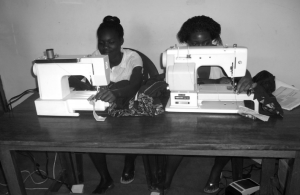 In Uganda, our partner organization is the Malaba Youth Center, which caters to both in- and out-of-school youth in this volatile region along the Uganda-Kenya border. Youth here are at especially high risk of contracting HIV/AIDS, particularly those who drop out of school. As one might expect, job opportunities in this region are few. And they are fewer still without a high school or vocational education. The sewing machines we send to the Malaba Youth Center are used specifically for vocational training. Students learn to become tailors, but they can also begin to earn an income as their skills develop. Along with this, they are also keeping themselves safe from the temptations that lure so many of their peers into troubled lives. And once they have a valuable skill, they can remain free from the poverty that would otherwise define them.
In Uganda, our partner organization is the Malaba Youth Center, which caters to both in- and out-of-school youth in this volatile region along the Uganda-Kenya border. Youth here are at especially high risk of contracting HIV/AIDS, particularly those who drop out of school. As one might expect, job opportunities in this region are few. And they are fewer still without a high school or vocational education. The sewing machines we send to the Malaba Youth Center are used specifically for vocational training. Students learn to become tailors, but they can also begin to earn an income as their skills develop. Along with this, they are also keeping themselves safe from the temptations that lure so many of their peers into troubled lives. And once they have a valuable skill, they can remain free from the poverty that would otherwise define them.
Nicaragua Sewing Machine Program
In the developing world, in the hands of someone who knows how to use one, a sewing machine means instant income. The following two profiles are fairly typical examples of how sewing machines help people in the developing world, whether in Latin America, Africa, or Eastern Europe.
Juan Carlos and Migdalia Davila
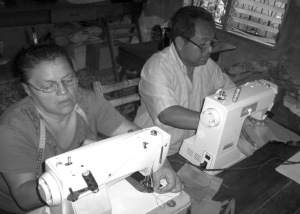 For years, Juan Carlos Davila worked by day as a receptionist at a private institution in Jinotepe. His wife, Migdalia, is a skilled seamstress. At night, he helped her with the sewing to earn extra money for their amily. His receptionist salary was barely enough for them and their 11-year-old son to get by on. As their tailoring business grew, it was their hope that one day they could come to depend on it as their sole income. But a second sewing machine, a new one, was far too costly.
For years, Juan Carlos Davila worked by day as a receptionist at a private institution in Jinotepe. His wife, Migdalia, is a skilled seamstress. At night, he helped her with the sewing to earn extra money for their amily. His receptionist salary was barely enough for them and their 11-year-old son to get by on. As their tailoring business grew, it was their hope that one day they could come to depend on it as their sole income. But a second sewing machine, a new one, was far too costly.
In November 2008, Juan Carlos was suddenly laid off from his receptionist job. Today, he and Migdalia survive because they can both sew, and because they were able to get a second sewing machine from Pedals for Progress through our partner organization Ecobicicleta Rivas. Today at their tailor shop, they make men’s suits, women’s dresses, curtains, table linens, and they are currently searching for an employee or two to expand their business.
Elvis Cruz
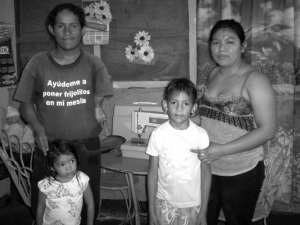 Elvis Cruz is 25 years old and from Managua, Nicaragua. He was born disabled, both of his arms are severely deformed. While this provided certain challenges, it hasn’t kept Elvis from working, playing baseball, or otherwise living a full life.
Elvis Cruz is 25 years old and from Managua, Nicaragua. He was born disabled, both of his arms are severely deformed. While this provided certain challenges, it hasn’t kept Elvis from working, playing baseball, or otherwise living a full life.
Married with two young children, Elvis works as a flagman directing traffic in Managua. But his income wasn’t enough to adequately support his family. After making a public appeal on a local TV show for the opportunity to earn more money, his wife received a sewing machine from one of our partners. A talented seamstress, now she works from their home earning extra income for their family.

